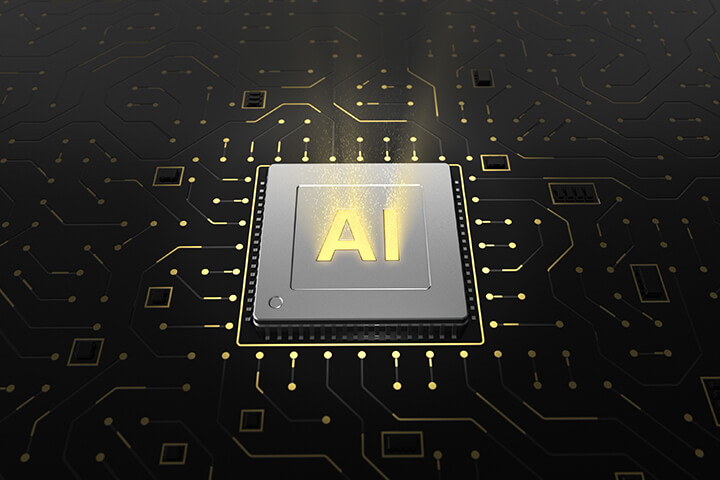Smart Artificial Intelligence (AI) Chips

7 Aug
2017
Humans have a powerful thinking ability, that is, we personalize various emotions and inanimate objects. It is not surprising that we do the same with computers, that is, perform calculations or describe predictions in terms of machine languages. Because humans have limited capability to perform various tasks simultaneously, the need for AI grew. This AI is a robot or a software that thinks intelligently, in a manner similar to how intelligent humans think.
What is AI?
The term, artificial intelligence (AI), came into existence owing to the need for performing various statistics and logic in real time. AI is the simulation of human intelligence processes by machines, especially computer systems. It is used for various purposes, including identification, calculation, control, design, surveillance, and diagnosis.
Why do we need smart AI chips?
AI chips help in making more intelligent decisions about some critical issue in absence of humans. These AI chips usually involve machine learning and deep learning algorithms to perform computations. The chip is designed with high parallel calculations to commercial hardware, mainly graphics processing units (GPUs). The AI chips accept input in the form of machine language (ML) and process this input with cloud data. The resultant data is stored on devices. AI chips are as smart as computers, robots, or software that work the same as humans think and use their logical and computational methods intelligently.
Most of the chip makers have been focusing on developing new solutions for smart AI chips and investing to have their impact in the competitive market. This gained the interest of small-scale companies and startups for development of smart AI chips.
How a smart AI chip works?
AI has natural language processing, which makes it capable of interpreting what you speak or type. Much of the processing in an AI chip involves matrix multiplication and addition. Large numbers of GPUs working in parallel offer an inexpensive approach, but the penalty is the higher power. When a question is asked, AI uses algorithms and machine learning to search through the huge database and delivers the best answer in a matter of seconds.
Consider the following figure that shows the working of smart AI chips. A person asks a question to the smart AI chip, which processes that question as input data to perform the task. The smart AI chip then uses its intelligence by performing natural language processing to convert the human language to machine language. It, then, performs certain calculations and uses logic, methods, or cloud data to get the required answer. The obtained result is then converted back to human-understandable language. This process is done within an eye blink, and hence, they are called as smart AI chips.
How smart is an AI chip?
The fusion of cloud and AI is a source of innovation and a means to accelerate change. The smart AI chip carries out a multitude of functions, which provide information about products, company, people, current updates, and others. It answers a wide array of questions and responds to them using its intelligence. Smart AI chips are used in devices for performing tasks, such as recognizing your voice commands, faces in photos, and human voices interaction; for example, if we ask, “how much traffic is there on route to office?”, the smart AI chip uses a real-time location tracer and answers the question. The top giant companies, such as Google and Amazon, have been working to provide products based on smart AI chips.
To become a leader in the AI technology, the top tech giants started investing in this field. The AI systems are made of software and hardware that work in parallel to support the calculations. This generated the need to develop their own AI chips for supporting their AI development. These chipsets have grown smaller and more sophisticated; for example, Google has designed an application-specific integrated circuit (ASIC) that handles complex processes. This chip is known as the tensor processing unit (TPU). It has an instruction set, so as TensorFlow programs are changed or new algorithms are developed, they can run on the TPU. This reduced its dependence on hardware makers. In consequence, the demand for specialized AI chips has been growing rapidly.
New approaches for smart AI chips
The AI chip market witnessed an increase in the adoption of this technology especially in the developing countries. The adoption of innovative techniques provides end users with advanced and innovated product offerings. The organizations have adopted strategies, such as cooperation, collaboration, product launch, partnership, R&D, and accession, to expand their geographical presence and increase their market share.
According to a recent report published by Allied Market Research, titled, Artificial Intelligence Chip Market, this market was valued at $661 million in 2016 and is projected to reach around $11 billion by 2023, growing at a CAGR of 49.6% from 2017 to 2023.
The smart AI chip has been actively upgraded with the new implementation of technologies. This started replacing human beings in a few industries and also limits some markets. These impacts have been reduced, because humans tend to adopt new changes more than that of smart AI chips.

Rosy Behera
Author's Bio- Rosy Behera holds a bachelor’s degree in Electrical and Electronics Engineering and now she is a content writer by profession. She loves to portray her thoughts and ideas with a nice command of words. Grabbing an audience with her creative write-ups is one of her biggest assets so far. Apart from writing, she is a certified “Odisi” dancer and has done Gardharva in Drawing, Painting, and Arts. She always explores new things through travel and is a big foodie.
Avenue: Entire Library membership of Allied Market Research Reports at your disposal
- Avenue is an innovative subscription-based online report database.
- Avail an online access to the entire library of syndicated reports on more than 2,000 niche industries and company profiles on more than 12,000 firms across 11 domains.
- A cost-effective model tailored for entrepreneurs, investors, and students & researchers at universities.
- Request customizations, suggest new reports, and avail analyst support as per your requirements.
- Get an access to the library of reports at any time from any device and anywhere.
Related Post
-
How are Submarine Cables Transforming Global Connectivity with Enhanced User Experience?
-
Endoscopy Procedures: Transformations in Techniques and Applications
-
AI-Powered Video Analytics: How the Product Actually Works for enterprises
-
Painting Robots: Transforming Precision Coating and Creative Applications
-
Innovations in Pharmacovigilance Systems Advancing Patient Safety
-
Understanding Edge Security: Keeping Data Safe Near the Source
-
Exploring the Use and Advancements of 3D Laser Scanners in Professional Applications
-
Reinforcing Industrial Controls with Smarter Tools and Training








